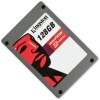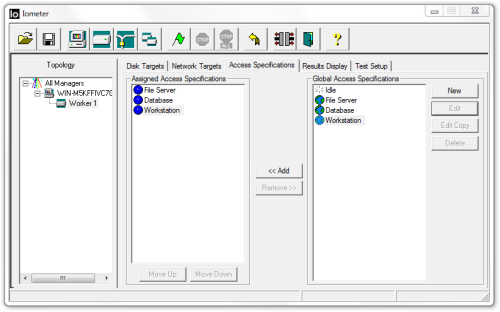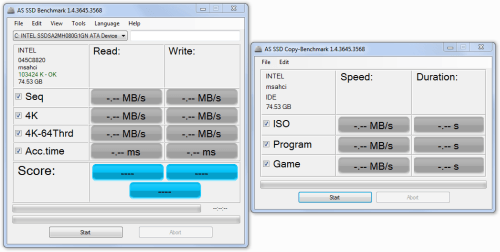- Qualcomm Launches Snapdragon 4 Gen 2 Mobile Platform
- AMD Launches Ryzen PRO 7000 Series Mobile & Desktop Platform
- Intel Launches Sleek Single-Slot Arc Pro A60 Workstation Graphics Card
- NVIDIA Announces Latest Ada Lovelace Additions: GeForce RTX 4060 Ti & RTX 4060
- Maxon Redshift With AMD Radeon GPU Rendering Support Now Available
Kingston SSDNow V+ Series 128GB

A couple of weeks ago, Kingston announced a revision to its V+ series of SSDNow drives. In addition to a brand-new controller from Toshiba being utilized, along with Toshiba NAND, the new V+ drives support TRIM right out of the box. This, along with good pricing and excellent performance, make the latest V+ drives well-worth looking out for.
Page 4 – Synthetic: Iometer & AS SSD
Iometer 2006.07.27
Originally developed by Intel, and since given to the open-source community, Iometer (pronounced “eyeawmeter”, like thermometer) is one of the best storage-testing applications available, for a couple of reasons. The first, and primary, is that it’s completely customizable, and if you have a specific workload you need to hit a drive with, you can easily accomplish it here. Also, the program delivers results in IOPS (input/output operations per second), a common metric used in enterprise and server environments.
The level of customization cannot be understated. Aside from choosing the obvious figures, like chunk sizes, you can choose the percentage of the time that each respective chunk size will be used in a given test. You can also alter the percentages for read and write, and also how often either the reads or writes will be random (as opposed to sequential). I’m just touching the surface here, but what’s most important is that we’re able to deliver a consistent test on all of our drives, which increases the accuracy in our results.
Because of the level of control Iometer offers, we’ve created profiles for three of the most popular workloads out there: Database, File Server and Workstation. Database uses chunk sizes of 8KB, with 67% read, along with 100% random coverage. File Server is the more robust of the group, as it features chunk sizes ranging from 512B to 64KB, in varying levels of access, but again with 100% random coverage. Lastly, Workstation focuses on 8KB chunks with 80% read and 80% random coverage.
Because these profiles aren’t easily found on the Web, with the same being said about the exact structure of each, we’re hosting the software here for those who want to benchmark their own drives with the exact same profiles we use. That ZIP archive (~3.5MB) includes the application and the three profiles in an .icf file.



Ironically, despite Iometer being created before SSDs even were around, the nature of these tests are going to inherently favor them due to their rapid, near instantaneous access times. Scenarios such as these are pretty much the bane of hard drives and illustrate why 15,000RPM SCSI drives exist. The large number of tiny, mostly random read and random write file operations will also be the anathema of any SSD controller that was designed primarily for large sequential read & write performance. Unfortunately, the Summit happens to use one of those very controllers, although in its defense, this is because Samsung chose to optimize their controllers for large sequential writes.
We can clearly see that the Toshiba controller shares this in common with the Samsung controller, although it performs much better, slotting between it and the X25. And if you think these results are unfavorable, just take another look at those hard drive numbers one more time by comparison…
AS SSD
As the name might hint, AS SSD is a nifty little program written exclusively for SSDs. It can be run on mechanical hard drives, but be warned that what should take minutes will take over an hour to benchmark! This handy little tool provides several read/write tests at important file sizes, but also includes a benchmark to simulate the transfer of three types of large files.
We selected this program for its precision, ability to generate large file sizes on the fly, and that it is written to bypass Windows 7’s automatic caching system. The tool does not bypass any onboard cache.





The 128GB V+ series Kingston performs well in the large sequential read test, although it fares less well with the dreaded 4KB file size tests. For the write tests, the Summit’s optimization for sequential writes comes to the surface, but Toshiba has apparently done the same. With a manufacturer-rated sequential write speed of 180MB/s, the Kingston drive comes respectively close to leaving the other drives in the dust. Again, the picture is less rosy when looking at small 4KB files, which are unfortunately the type of file most often used on a modern OS. Even if a file is <4KB, it must use an entire 4KB sector of the flash page to store the file.
Access times are critical to the responsiveness and feel of the system, and this graph says exactly why hard drives are considered the slowest part of a modern computer! Lastly, with the copy test, the Toshiba drive puts its advantage in large sequential writes to use to again pull ahead of the pack.
Support our efforts! With ad revenue at an all-time low for written websites, we're relying more than ever on reader support to help us continue putting so much effort into this type of content. You can support us by becoming a Patron, or by using our Amazon shopping affiliate links listed through our articles. Thanks for your support!






